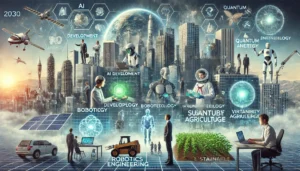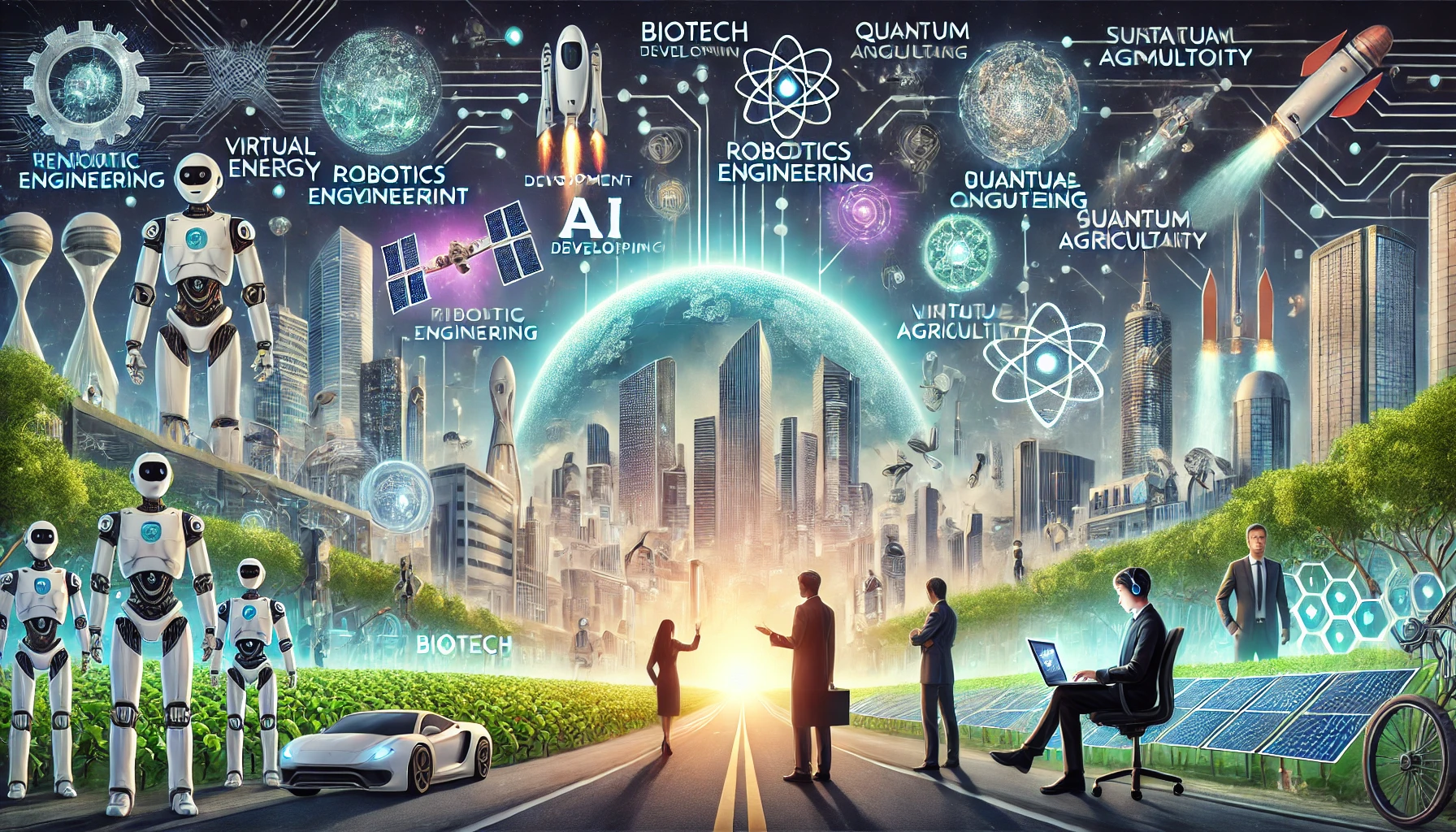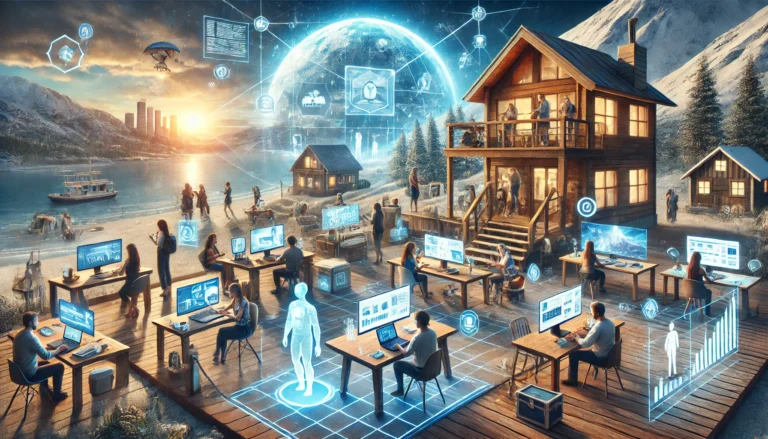Top 10 Future Careers You Should Prepare for in 2030
The future is fast approaching, and with it comes a wave of new job opportunities that didn’t exist a decade ago. The world is changing, driven by technology, sustainability, and the need for innovative solutions. In 2030, careers will look drastically different from what we know today. So, how do you prepare for these upcoming shifts in the job market? Let’s dive into the top 10 future careers you should prepare for in 2030. Whether you’re a student figuring out your career path or a professional looking to reskill, these jobs are sure to be in high demand.
1. AI Specialist
Artificial intelligence (AI) is transforming industries at a breakneck speed. From chatbots to self-driving cars, AI is set to become even more prominent by 2030. AI specialists will be needed to develop and improve machine learning algorithms, design intelligent systems, and ensure AI operates ethically.
To become an AI specialist, strong skills in computer science, mathematics, and data science are essential. It’s also important to understand ethical considerations as AI begins to play a larger role in everyday life. This field promises great opportunities for those willing to stay ahead of technological advancements.
2. Data Scientist
Data is the new oil, and data scientists are the miners. By 2030, nearly every industry will rely heavily on data to make informed decisions. Whether it’s healthcare, finance, or marketing, data scientists will play a crucial role in analyzing trends, forecasting outcomes, and driving innovation.
This career requires a deep understanding of statistics, machine learning, and coding languages like Python and R. If you’re analytical and enjoy problem-solving, becoming a data scientist could be your golden ticket to future success.
3. Renewable Energy Technician
As the world pushes toward greener, more sustainable energy solutions, the demand for renewable energy technicians will soar. These professionals will be responsible for installing, maintaining, and improving renewable energy systems like solar panels, wind turbines, and electric vehicle charging stations.
With the climate crisis intensifying, countries around the world are focusing on cleaner energy sources. A career in renewable energy is not only future-proof but also contributes to saving the planet—a win-win!
4. Cybersecurity Expert

With the rise of digital transformation comes the threat of cyberattacks. By 2030, cybersecurity experts will be critical in protecting sensitive data from hackers and ensuring the safety of digital infrastructures. From online banking systems to personal data, everything will need to be secure in this increasingly connected world.
To thrive in cybersecurity, you’ll need a background in IT and a knack for problem-solving. It’s a high-stakes, high-reward career that will remain essential as technology evolves.
5. Healthcare Support Specialist
The healthcare industry is undergoing a significant transformation, especially with advancements in telemedicine and personalized healthcare. Healthcare support specialists will be needed to provide a range of services, from managing patient data to supporting remote medical consultations.
This career doesn’t always require a medical degree but does demand strong technical and communication skills. As the population ages and healthcare becomes more digitized, the demand for these specialists will grow.
6. Virtual Reality (VR) Developer
Remember when VR was considered just a cool gaming technology? Well, by 2030, it will be so much more. From virtual meetings and training simulations to immersive entertainment, VR will impact various sectors. As a VR developer, you’ll create virtual worlds for industries ranging from education to healthcare.
To enter this field, you’ll need skills in 3D modeling, game development, and software engineering. If you love tech and creativity, this is a futuristic job you won’t want to miss.
7. Digital Marketing Specialist
Marketing is evolving, and by 2030, it will be almost entirely digital. As businesses continue to shift to online platforms, digital marketing specialists will be in high demand. These professionals create targeted ad campaigns, analyze consumer behavior, and manage online reputations.
A deep understanding of SEO, social media, and content creation is crucial in this field. If you’re creative and have a passion for storytelling, this career will allow you to thrive in the digital world.
8. Genetic Counselor
With the advancements in genetic testing and personalized medicine, genetic counselors will play a pivotal role in healthcare by 2030. These professionals help patients understand their genetic makeup and the risks for inherited diseases. They also guide individuals in making informed medical decisions.
A background in biology, genetics, and psychology is key for this career. If you’re fascinated by how science can shape personal health, this field is both cutting-edge and impactful.
9. Urban Planner for Smart Cities
By 2030, cities will be smarter, relying on technology to improve the quality of life for their citizens. Urban planners will need to design cities that integrate smart technologies, from energy-efficient buildings to sustainable transportation systems. The goal? To create more livable, efficient urban environments.
This role requires a mix of skills in architecture, engineering, and environmental science. If you’re passionate about shaping the cities of the future, this career will offer endless opportunities to make a difference.
10. Space Tourism Guide
Yes, you read that right—space tourism will be a thing by 2030! With companies like SpaceX and Blue Origin making strides in commercial space travel, space tourism guides will be needed to help travelers navigate the final frontier. They’ll provide safety briefings, manage tours, and offer insights into space travel.
While this job may sound like science fiction, it’s quickly becoming a reality. A background in astronomy, physics, or even hospitality management could help you land this out-of-this-world career.
How to Prepare for the Future Job Market
So, how can you ensure you’re ready for these exciting careers in 2030? The key is to stay adaptable and continuously learn new skills. Whether you pursue formal education, online courses, or hands-on experience, staying curious and proactive will put you ahead of the curve. Consider the industries that are growing, like AI, renewable energy, and healthcare, and focus on the skills that will be most in demand.
Conclusion
The future is filled with limitless possibilities, and the careers of tomorrow are no exception. From AI specialists to space tourism guides, the jobs of 2030 will require a mix of creativity, technical knowledge, and adaptability. While some of these careers may seem far-fetched today, they are shaping up to be essential roles in the coming decade. Start preparing now, stay informed about industry trends, and embrace continuous learning. The future job market is yours for the taking!
FAQs
1. What skills will be most in demand in 2030?
In-demand skills will include expertise in AI, data analysis, digital marketing, and cybersecurity, along with soft skills like adaptability, creativity, and problem-solving.
2. Do I need a college degree to pursue these careers?
Not necessarily. While some fields like healthcare or genetic counseling require formal education, others like digital marketing and renewable energy offer alternative pathways through certifications and practical experience.
3. How can I keep up with future job trends?
Stay updated by following industry news, taking online courses, and networking with professionals in emerging fields. It’s important to embrace lifelong learning.
4. Will automation eliminate jobs by 2030?
While automation will change the job landscape, it will also create new opportunities in fields like AI, robotics, and tech support. Many jobs will shift rather than disappear.
5. What’s the best way to start preparing for a career in 2030?
Start by identifying your interests and exploring future-focused fields. Take advantage of online resources, build relevant skills, and remain adaptable to change.







